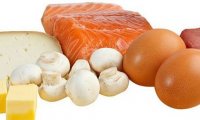Products containing vitamin D
The role of vitamin D in the body
Unlike other substances in the group, vitamin D is slightly different, since it is rather a hormone that is produced by our body in contact with sunlight. The presence of vitamin D is not only the conditions, but it is one of the most important factors needed for calcium absorption.
The absorption of calcium for the body is not an easy task, as to create a favorable environment for this purpose, there must be many trace elements. Given the fact that many of us, especially those who live in the north, sometimes do not see the sun for months on end, dairy producers have started to enrich them with vitamin D.
In Finland, for example, most dairy products are rich in this vitamin, so that people could make up for the disadvantage arising from the shortage of sunny days.
Despite the fact that no study has proved that vitamin D deficiency may be the cause of various ailments and diseases known fact that people with too low levels of the vitamin in the blood more likely to suffer:
Breast cancer;
Obesity;
Prostate cancer;
Depression;
Heart disease;
Cancer of the large intestine.
Further use of vitamin D for bone growth and strength, these vitamin supplements are often prescribed as an adjuvant in the treatment of diseases such as:
Autoimmune diseases;
Osteoporosis;
High blood pressure;
Diabetes;
Cardiovascular disease;
Tumors.
Whatever it was, the only scientifically proven effects of vitamin D is considered to be its role in the absorption of calcium. Since the human body can absorb only a third of the calcium that comes from food, do not underestimate the importance of this vitamin.
How to get enough vitamin D?
The best way to provide your body the right amount of vitamin D is 30 minutes of exposure in the sun at least 2 times a week.
Fact. It is proved that people with a higher percentage of body fat need more vitamin D
In the winter months, experts recommend to pay more attention to the foods rich in vitamin D, as well as to consider the possibility of taking dietary supplements and dairy products fortified with this vitamin.
How much vitamin D you need my body?
The minimum amounts of vitamins for the child and an adult is considered 15mkg day. Many doctors also recommend getting at least 25mkg every day.
It is especially important to growing children get enough vitamin D. During this period, the bones are growing rapidly and the lack of calcium prevents the proper development of the skeletal system.
What is the form of vitamin D is best?
This vitamin can enter the body in two forms:
Cholecalciferol (vitamin D3) is synthesized in the skin when exposed to sunlight;
Ergocalciferol (vitamin D2) we get from food.
Despite the fact that most experts recommend supplements it with vitamin D3, recent studies have shown that the ergocalciferol has the same effect as cholecalciferol.
So, choosing what to buy vitamins, guided better reputation manufacturer.
Vitamin D deficiency - the risks and symptoms
If you do not particularly like to go outside on sunny days, or in the area where you live, you can see the sun rarely, if you are a vegan or suffer from intolerance to lactose or do not like dairy products, the lack of vitamin D in your body may occur.
When it may be a lack of vitamin D in the body?
Vegan diet;
Lack of exposure to sunlight;
Dark skin. A large amount of melanin in the skin prevents it from producing vitamin D;
Kidney disease;
The failure of the gastric tract to absorb vitamin D because of some diseases such as Crohn's disease.
Excess weight.
Symptoms of deficiency
Unfortunately, symptoms of vitamin D deficiency are not so many, and they are not pronounced. However, when muscle weakness or pain in the bones, doctors do tests to check the level of vitamin D in the blood.
Prolonged deficiency of vitamin D, there is a risk of serious bone diseases, such as bone and soft skeletal deformity.
What foods contain vitamin D?
Foods containing vitamin D, surprisingly little. Maybe it's because our bodies are accustomed to getting it with the sun's rays?
However, it does not matter by what authority we get this vitamin. Whether the skin or stomach, getting into the body, vitamin D is easy to digest and does the job.
There are 3 super-product content of vitamin D. These include:
Trout and salmon -100gr = 112% of the daily minimum of vitamin D;
Mackerel (100g = 100% of the daily wage);
Cod liver oil (1 teaspoon = 340%);
Additionally, a good source of vitamin D, are:
Tuna in brine (100g = 40%);
Sardines in oil (100g - 12%);
Milk or yogurt fortified with vitamin D - 25% of the daily low;
Beef liver (100 g = 12%);
Egg yolks (1 egg = 10%);
Cheese (100 g = 9%).
Vitamin D in food mainly in fish and there is meat from plant sources may be mentioned except that the fungi that were exposed to UV light for increasing the amount of vitamin D in them. However, this practice is not particularly popular with our producers, so if you prefer vegetables meat products, you probably should think about taking supplements with the vitamin, especially in the winter months.
Unlike other substances in the group, vitamin D is slightly different, since it is rather a hormone that is produced by our body in contact with sunlight. The presence of vitamin D is not only the conditions, but it is one of the most important factors needed for calcium absorption.
The absorption of calcium for the body is not an easy task, as to create a favorable environment for this purpose, there must be many trace elements. Given the fact that many of us, especially those who live in the north, sometimes do not see the sun for months on end, dairy producers have started to enrich them with vitamin D.
In Finland, for example, most dairy products are rich in this vitamin, so that people could make up for the disadvantage arising from the shortage of sunny days.
Despite the fact that no study has proved that vitamin D deficiency may be the cause of various ailments and diseases known fact that people with too low levels of the vitamin in the blood more likely to suffer:
Breast cancer;
Obesity;
Prostate cancer;
Depression;
Heart disease;
Cancer of the large intestine.
Further use of vitamin D for bone growth and strength, these vitamin supplements are often prescribed as an adjuvant in the treatment of diseases such as:
Autoimmune diseases;
Osteoporosis;
High blood pressure;
Diabetes;
Cardiovascular disease;
Tumors.
Whatever it was, the only scientifically proven effects of vitamin D is considered to be its role in the absorption of calcium. Since the human body can absorb only a third of the calcium that comes from food, do not underestimate the importance of this vitamin.
How to get enough vitamin D?
The best way to provide your body the right amount of vitamin D is 30 minutes of exposure in the sun at least 2 times a week.
Fact. It is proved that people with a higher percentage of body fat need more vitamin D
In the winter months, experts recommend to pay more attention to the foods rich in vitamin D, as well as to consider the possibility of taking dietary supplements and dairy products fortified with this vitamin.
How much vitamin D you need my body?
The minimum amounts of vitamins for the child and an adult is considered 15mkg day. Many doctors also recommend getting at least 25mkg every day.
It is especially important to growing children get enough vitamin D. During this period, the bones are growing rapidly and the lack of calcium prevents the proper development of the skeletal system.
What is the form of vitamin D is best?
This vitamin can enter the body in two forms:
Cholecalciferol (vitamin D3) is synthesized in the skin when exposed to sunlight;
Ergocalciferol (vitamin D2) we get from food.
Despite the fact that most experts recommend supplements it with vitamin D3, recent studies have shown that the ergocalciferol has the same effect as cholecalciferol.
So, choosing what to buy vitamins, guided better reputation manufacturer.
Vitamin D deficiency - the risks and symptoms
If you do not particularly like to go outside on sunny days, or in the area where you live, you can see the sun rarely, if you are a vegan or suffer from intolerance to lactose or do not like dairy products, the lack of vitamin D in your body may occur.
When it may be a lack of vitamin D in the body?
Vegan diet;
Lack of exposure to sunlight;
Dark skin. A large amount of melanin in the skin prevents it from producing vitamin D;
Kidney disease;
The failure of the gastric tract to absorb vitamin D because of some diseases such as Crohn's disease.
Excess weight.
Symptoms of deficiency
Unfortunately, symptoms of vitamin D deficiency are not so many, and they are not pronounced. However, when muscle weakness or pain in the bones, doctors do tests to check the level of vitamin D in the blood.
Prolonged deficiency of vitamin D, there is a risk of serious bone diseases, such as bone and soft skeletal deformity.
What foods contain vitamin D?
Foods containing vitamin D, surprisingly little. Maybe it's because our bodies are accustomed to getting it with the sun's rays?
However, it does not matter by what authority we get this vitamin. Whether the skin or stomach, getting into the body, vitamin D is easy to digest and does the job.
There are 3 super-product content of vitamin D. These include:
Trout and salmon -100gr = 112% of the daily minimum of vitamin D;
Mackerel (100g = 100% of the daily wage);
Cod liver oil (1 teaspoon = 340%);
Additionally, a good source of vitamin D, are:
Tuna in brine (100g = 40%);
Sardines in oil (100g - 12%);
Milk or yogurt fortified with vitamin D - 25% of the daily low;
Beef liver (100 g = 12%);
Egg yolks (1 egg = 10%);
Cheese (100 g = 9%).
Vitamin D in food mainly in fish and there is meat from plant sources may be mentioned except that the fungi that were exposed to UV light for increasing the amount of vitamin D in them. However, this practice is not particularly popular with our producers, so if you prefer vegetables meat products, you probably should think about taking supplements with the vitamin, especially in the winter months.

